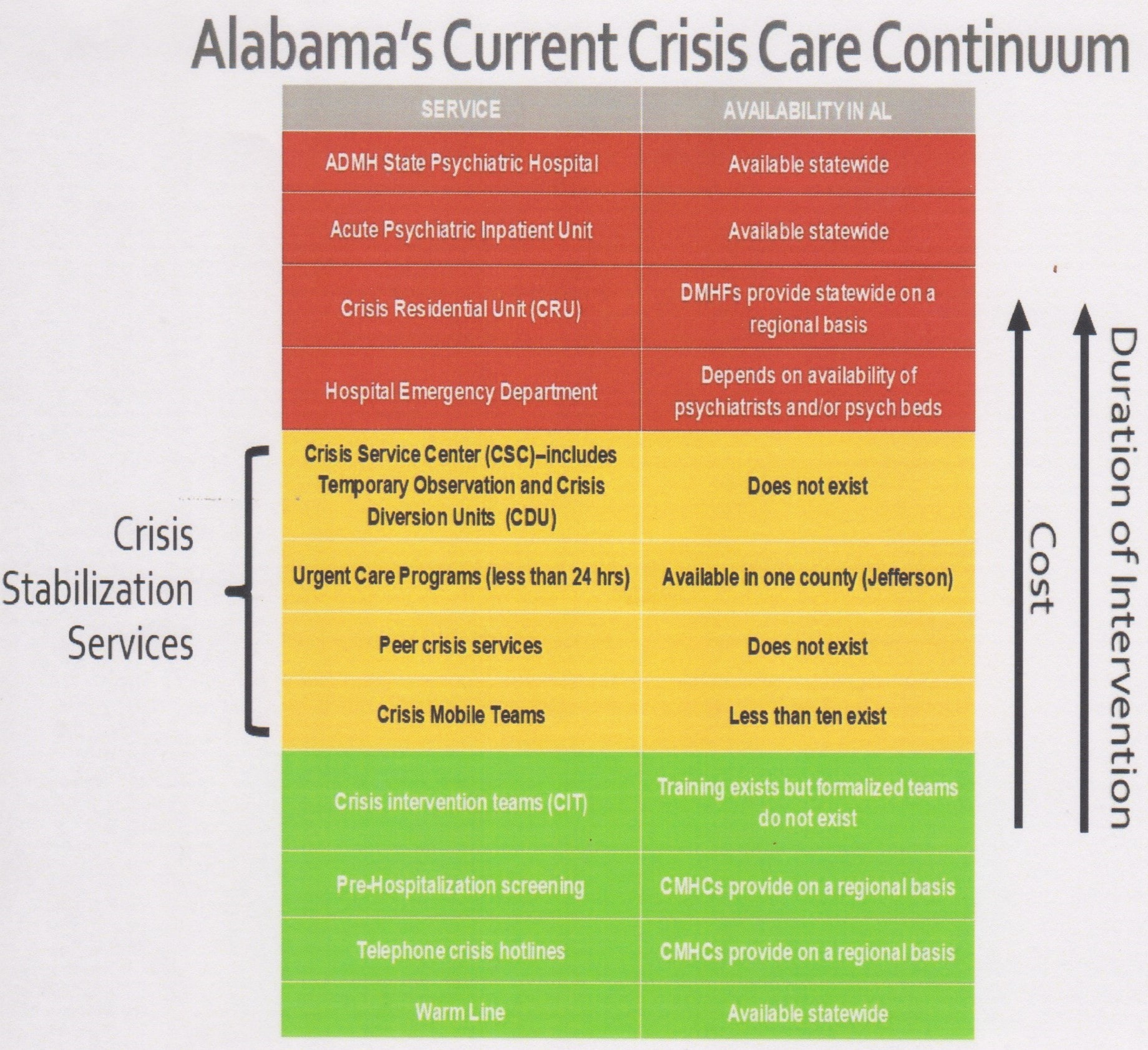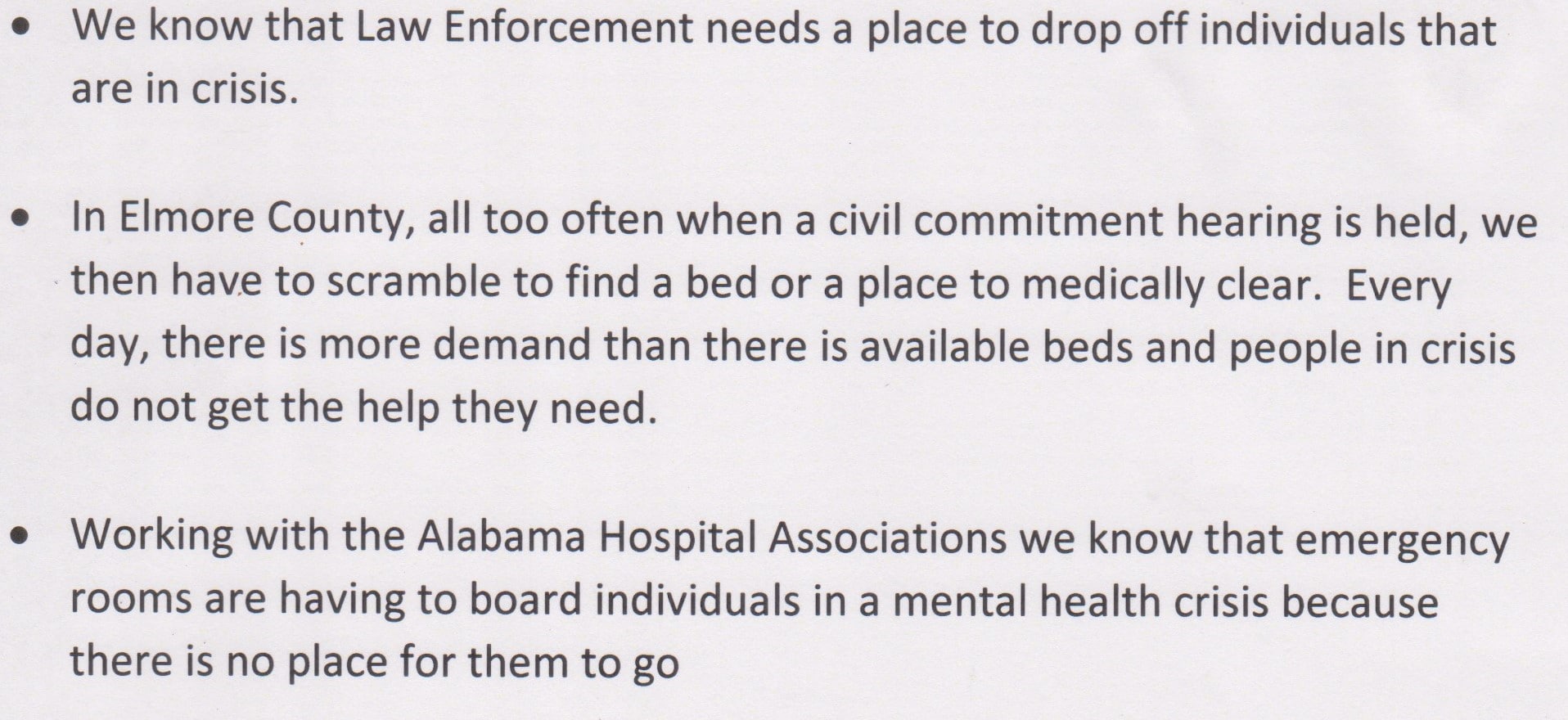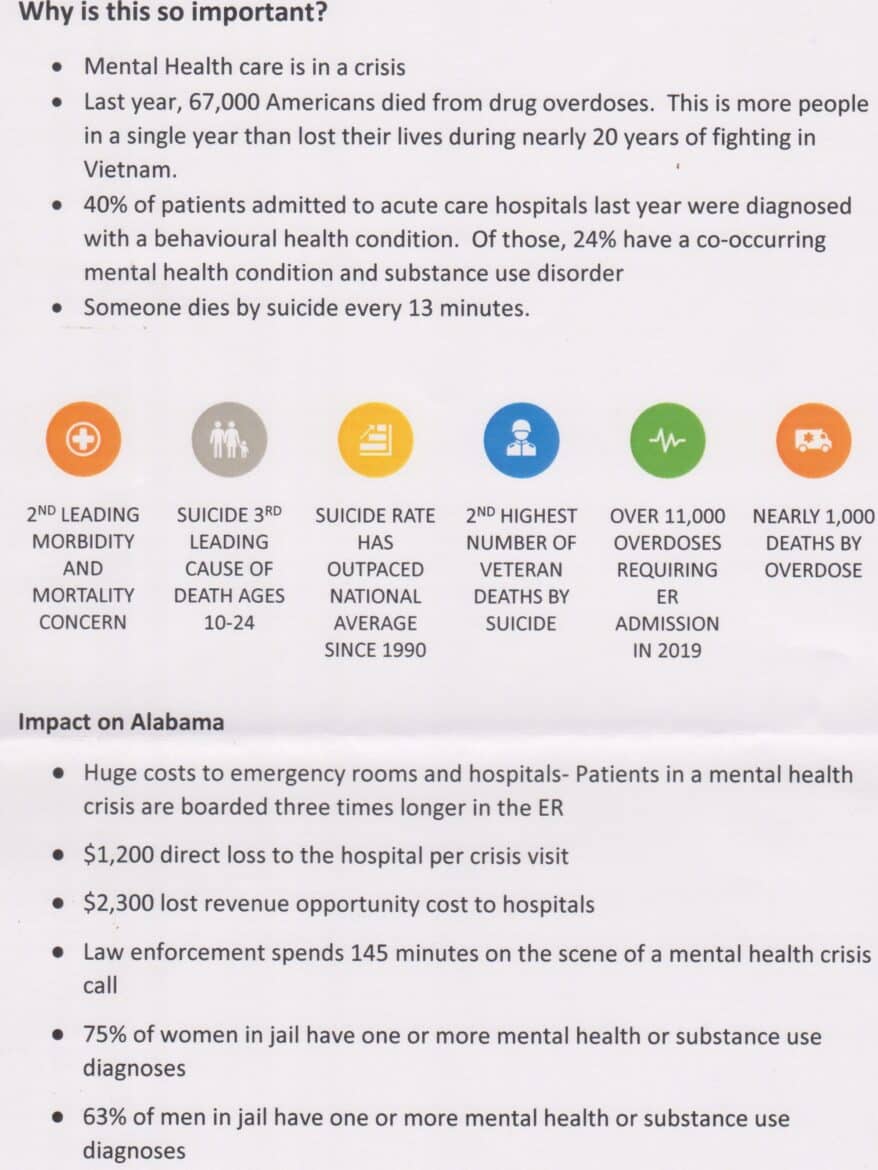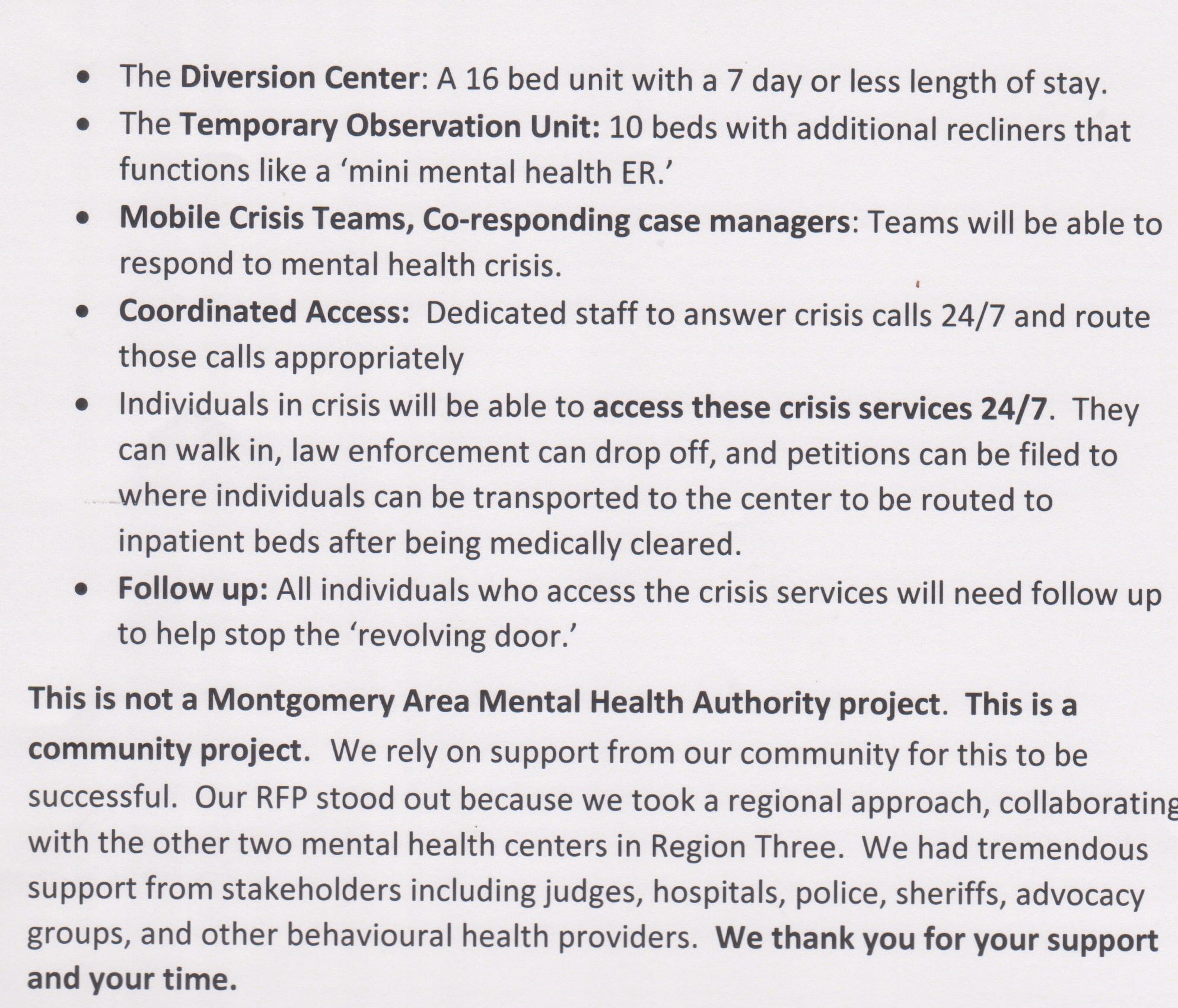BY SARAH STEPHENS

ELMORE/AUTAUGA NEWS
In October of last year, Alabama Governor Kay Ivey announced that funding was made available for three much-needed Crisis Diversion Centers in the state for mental health issues, one of which would be located in Montgomery.
These centers would take a step to help with the mental health crisis in our area, where trying to find resources and facilities for those with mental health/substance abuse issues is frustrating, at best.
Note: I have reached out to several agencies attempting to find information on the status of those Crisis Diversion Centers, and will update accordingly.
This past week, two representatives of the Montgomery Area Mental Health Authority spoke before the Elmore County Commission, concerning the dire need for the facility and resources, asking for financial support in their efforts.
Currently the Commission does allocate money to the agency, and members have told the EAN that more would be considered if there was a direct benefit to Elmore County.
The current state of affairs of mental health is that beds for those in need are rarer than hen’s teeth. Law enforcement, families and loved ones trying to find help for someone in need are often met with, “We just don’t have any available beds.”
The reasons: System-wide across the state most of the larger facilities were closed years ago with the plan to open smaller, community facilities. However, funding for those agencies did not materialize, and the health crisis became worse. Until the announcement last year, there was no momentum.
With the advent of COVID, and the fear of spreading the virus, even jails are not readily accepting some prisoners, and a person cannot be jailed simply because they have mental health issues. There must be a crime or serious threat attached.
The law is set up that if no beds are available, law enforcement can take the patient to a hospital temporarily. However, with COVID, that has become extremely difficult as well.
There was a time when if someone was considered a danger to themselves or others, Probate Offices across the state would work to have the person committed. In Alabama, Probate Judges oversee mental health commitments, a fact that many do not realize. I often speak with law enforcement who are often told no beds are available. Again, without an actual crime to attach a person with mental health issues, they cannot be placed in a jail.
In speaking to area law enforcement across Autauga and Elmore counties, mental health has always been a serious issue, but in recent years finding facilities for those in need has become much more difficult.
There are few, if any beds, available for long-term care at any given time. Too often, even if someone is taken in, it is for a few days and they are then sent back to family members or released on their own. Most of these families are already to the point they are asking for help and are not qualified to handle the issues.
This is not a blame game on my part. This is simply pointing out a systematic failure to deal with mental health from the top to the bottom.

So, when the Governor announced the three planned Crisis Diversion Centers had received funding last year, it was fantastic news. It was a step in the right direction.
But as the representatives from Montgomery Area Mental Health explained Monday at the Commission meeting, there will still be limitations on space. Each county will NOT be allocated a certain number of beds, but rather service will be offered on a first come, first served basis.
This is a very broad subject, with a lot of intricacy that one article could never cover.
This issue is very close to my heart, as many times in recent years I have been the one trying to find help for someone I care about that suffers from mental illness. Too many times, drug/alcohol addiction go hand in hand with mental illness, as some try to self-medicate when actual help isn’t there.
Without insurance, it truly becomes a nightmare. Mental health care does not come cheap, and a private facility’s expense can wipe out life savings with a quickness.
So, consider this an introduction to a series of stories I want very much to do where I explain the issues that our own Probate Judges, families and law enforcement face daily. These officials and family members want very much to help, but honestly there are so many hurdles to jump. With COVID it only became worse.
Below is the press release from October of last year that explains the funding, location of the planned Crisis Diversion Centers across the state. I should be getting an update soon about the status of those centers, so more articles are coming.
If you have a family member or loved one that you are trying to help without success, I would like to hear your story. You will remain anonymous. You can reach me at editorsarah@yahoo.com.

FROM GOVERNOR KAY IVEY’S OFFICE
MONTGOMERY – Governor Kay Ivey announced (In October of last year), along with Commissioner Lynn Beshear of the Alabama Department of Mental Health and House Majority Leader Nathaniel Ledbetter, the awardees of funding for crisis centers to serve individuals with mental illness and substance use disorders.
The providers and locations of the new crisis centers are AltaPointe Health in Mobile, the Montgomery Area Mental Health Authority, and WellStone Behavioral Health in Huntsville.
“Behavioral health care in Alabama is changing to better meet the needs of our citizens,” Governor Ivey said. “Expanding and enhancing access to crisis care services will also provide a range of tools to divert individuals from emergency departments and jails, maximize the limited behavioral health workforce, and most importantly, improve the quality of life for Alabama families and communities.”
The crisis care centers are a designated place for communities, law enforcement, first responders, and hospitals to take an individual who is in mental health crisis. The crisis care centers will include both walk-in access for individuals and the ability for hospital emergency departments and law enforcement agencies to transfer individuals to the center for crisis care, including short-term admission, medication management, and case management. Services will also include discharge planning and connections to ongoing behavioral health care services for longer-term care, if needed.
“We applaud the governor’s leadership and the legislature’s investment to establish these three pilot centers and create a safe place for those in crisis, which will offer a new level of care in our state,” Commissioner Beshear said. “Behavioral health crisis services are one of the most effective tools within a statewide system of care to improve the lives of people with mental health or substance abuse disorders.”
In the 2020 legislative session, Governor Ivey prioritized establishing a metal health crisis continuum of care, with efforts in the Alabama Legislature led by House Majority Leader Nathaniel Ledbetter. The crisis care centers are a result of an $18 million appropriation in the FY2021 General Fund budget approved earlier this year. The awards were granted through a Request for Information and competitive Request for Proposal evaluation and selection process.
“We have an opportunity to truly deliver on the commitment to better health outcomes for all Alabamians,” House Majority Leader Ledbetter said. “Without these types of crisis centers in Alabama, those in a mental health crisis will continue to be taken and admitted improperly into local jails and hospital emergency departments. There is an opportunity now to commit to improved crisis care for those with acute mental health needs and substance use disorders.”
These centers will help to:
Reduce the number of arrests
Reduce the frequency of visits to hospital emergency departments
Sarah Stephens can be reached at editorsarah@yahoo.com







